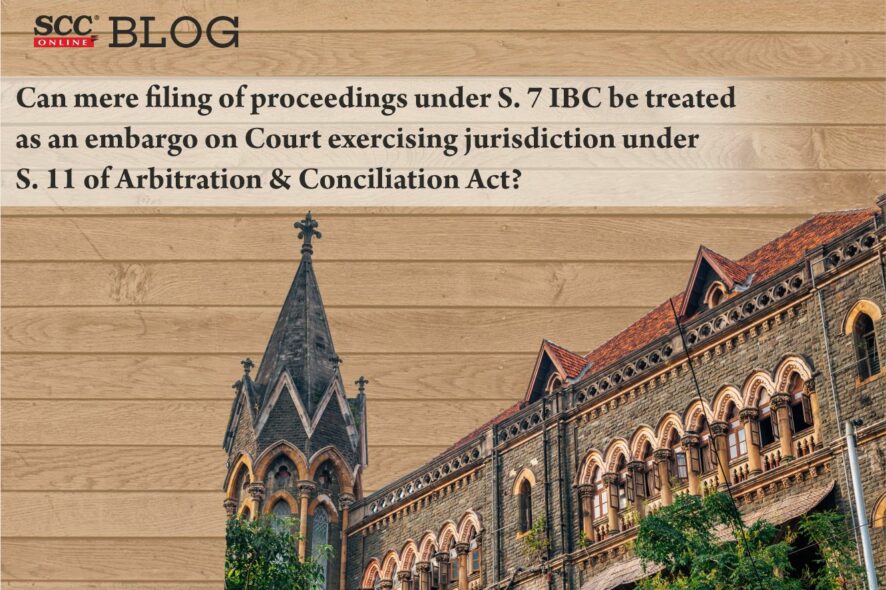Bombay High Court: A very interesting question was considered by G.S. Kulkarni, J., the question being, whether mere filing of a proceeding under Section 7 of the Insolvency and Bankruptcy Code, 2016 would amount to an embargo on the Court considering an application under Section 11 of the Arbitration and Conciliation Act, 1996, to appoint an arbitral tribunal?
Factual Background
In the present matter, the respondent provided financial assistance to the applicant of an amount of Rs 4,50,00,000 for which a loan agreement was entered between the applicant and the respondent, referred to as Agreement 1.
Due to a change in the business scenario, another Agreement was executed referred to as Agreement 2, under which the date of repayment of the borrowing was extended.
There were defaults on the part of the applicant in the payment of the loan instalments.
Applicant’s case was that in the discharge of its liability towards the respondent under the above-stated agreements, the applicant issued a cheque to the respondent, of an amount of Rs 31,08,33,457 being the repayment of the respondent’s dues, which was in accordance with the terms and conditions of the loan agreement.
Respondent had approached the NCLT by initiating proceedings against the applicant under Section 7 of the Insolvency and Bankruptcy Code, 2016.
Though, so far, no order had been passed by the NCLT admitting the petition as per the provisions of Section 7(5) of the IBC.
Analysis and Decision
High Court observed that there was no dispute in regard to the arbitration agreements between the parties and there was a dispute in regard to the invocation of the arbitration agreement.
Thus, the primary considerations for this Court to exercise jurisdiction under Section 11(6) were certainly present.
The Bench stated that, even if an application under Section 8 of the ACA is filed, the adjudicating authority has a duty to advert to the contentions put forth under an application filed under Section 7 of the IBC by examining the material placed before it by the financial creditor and record a satisfaction as to whether there is default or not.
“…if the irresistible conclusion of the adjudicating authority (NCLT) is that there is default and the debt is payable, the bogey of arbitration to delay the process would not arise despite the position that the agreement between the parties contains an arbitration clause.”
The Bench observed that,
“…mere filing of the proceedings under Section 7 of the IBC cannot be treated as an embargo on the Court exercising jurisdiction under Section 11 of the ACA, for the reason that only after an order under sub-section (5) of Section 7 of the IBC is passed by the NCLT, the Section 7 proceedings would gain a character of the proceedings in rem, which would trigger the embargo precluding the Court to exercise jurisdiction under the ACA, and more particularly in view of the provisions of Section 238 of IBC which would override all other laws.”
Hence, as noted in the present case, the Corporate Insolvency Resolution Process initiated by the respondent is yet to reach a stage of the NCLT passing an order admitting the said proceedings, the Court would not be precluded from exercising its jurisdiction under Section 11 of the ACA, when admittedly, there was an arbitration agreement between the parties and invocation of the arbitration agreement had been made, which was met with a refusal on the part of the respondent to appoint an arbitral tribunal.
While concluding the matter, Bench held that, the Court would be required to allow the present application by appointing an arbitral tribunal for adjudication of the disputes and differences which arose between the parties under the agreements in question.
Though the Court added that a formal order appointing an arbitral tribunal was not required to be made as after the judgment was reserved, the parties just two days back, settled the disputes stating that arbitration was not warranted. [Jasani Realty (P) Ltd. v. Vijay Corpn., 2022 SCC OnLine Bom 879, decided on 25-4-2022]
Advocates before the Court:
Dr. Birendra Saraf, Senior Advocate a/w. Anshul Anjarlekar i/b. Raval- Shah & Co., Advocate for the Applicant.
Mr.Yusuf Iqbal Yusuf i/b. Y. and A Legal, Advocate for the Respondent.






